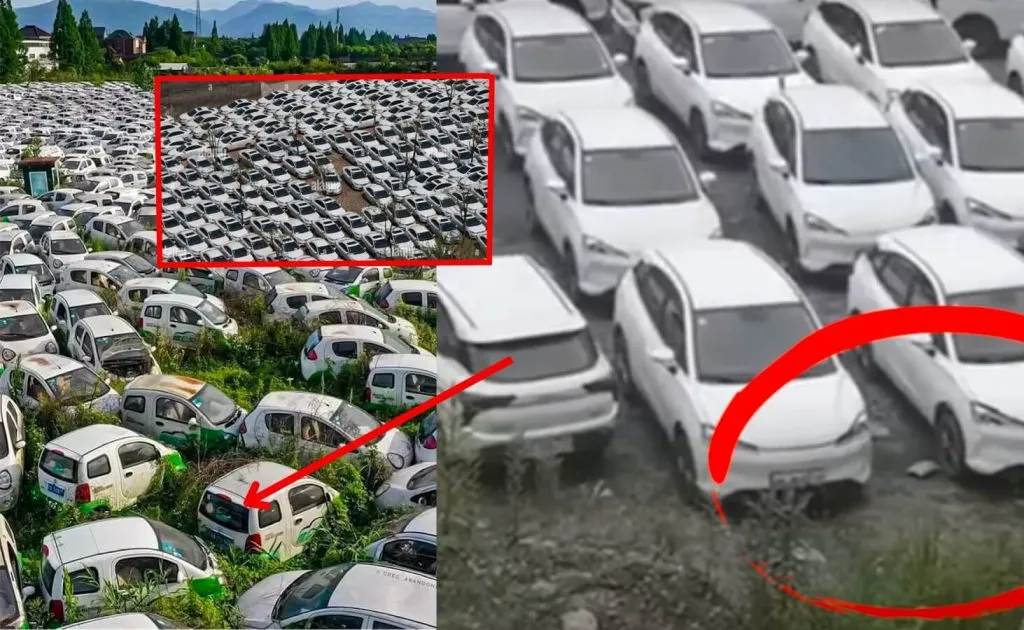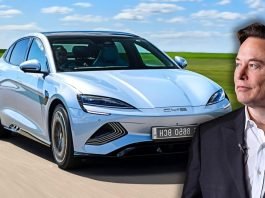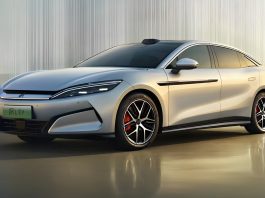Do you know about the great bicycle graveyards in China? Thousands and thousands of bicycles left abandoned in large fields and spaces??
Now, you’ll probably say so what, China indeed is popular for doing mass production and having space issues. But this is not it. Think of a similar scale issue but with electric cars!
According to Chinese media reports, a startling sight unfolded on the outskirts of Hangzhou as thousands of deserted electric cars were found parked alongside a river. The news got some limelight when was first shared in 2019 and claimed to be parked in France to be given to civil servants, but was later debunked.
These vehicles, linked to an electric car rental company Microcity in Hangzhou, had been left idle despite the company’s self-proclaimed status as a leading player in the “car sharing” industry.
The mysterious scene has sparked curiosity and raised questions about the reasons behind such a vast collection of tossed electric cars in this picturesque Chinese city. Now a YouTube channel, Serpentza shared a video explaining how such scams are causing serious environmental damage in the name of all greenwashing.
Let’s get to the details!!

Table of Contents
Thousands Of EVs Abandoned In A Graveyard
Prepare yourself for a jaw-dropping sight captured by trusty drone footage showing vast fields of abandoned shared cars! Yes, you heard that right.
The discovery of hundreds of unused electric vehicles parked along a river outside of Hangzhou has sparked intrigue and raised concerns about Microcity, a popular electric car rental company in the area.
These EVs are parked in three different sections, and when the company was questioned, they said that all their cars were in active use, but the evidence suggested otherwise.
As a reporter delved deeper into the matter in 2019, suspicions grew stronger when attempting to access the vehicles through the company’s app, but no available cars. It became quite clear that something peculiar was occurring behind the scenes, a potential greenwashing scam.
In a revealing video report, an interviewed villager disclosed that Microcity had been compensating him with a substantial annual sum of over 30,000 yuan (USD 4,469) since July of the previous year.
His role was to provide parking space on his land for the company’s surplus cars. This compensation shed light on the magnitude of the arrangement between Microcity and the villagers, indicating a significant financial incentive for accommodating the unused vehicles.
Another villager shared her astonishment with a local newspaper, expressing that she had never witnessed such a vast number of cars in her entire life. Despite her curiosity and desire to approach the cars, she was prohibited from getting closer, further adding to the air of mystery surrounding the situation. The arrangement between the company and the resident indicated a deliberate effort to conceal the true status of these electric cars, leaving everyone in mystery.
The news got quite some highlight around the time as it was being called the bubble-burst for EV rental companies first shared by @gregabandoned on Instagram.
Who Is Microcity?
Microcity is one of the many “car-sharing” companies that emerged in recent years, joining the ranks of hundreds of similar ventures in China. These companies, with the most successful ones boasting fleets comprising tens of thousands of vehicles, sought to capitalize on the rising trend of the sharing economy, even though their model leaned more towards rental services rather than true sharing.
The proliferation of electric vehicles (EVs) in China also played a significant role in their growth, thanks in part to substantial government tax rebates and benefits provided to new energy car manufacturers.
Microcity, a captivating startup founded in 2013, quickly emerged as a prominent player in China’s car-sharing industry. Notably, it enjoyed strong backing from Geely, a major automotive company. All of Microcity’s vehicles were sourced from Kandi EV, a joint venture between Geely and Kandi Group, further solidifying its industry presence.
The startup thrived initially thanks to substantial support from the Hangzhou government, which extended valuable benefits such as complimentary parking spaces and subsidies for infrastructure construction and charging facilities.
By late 2016, Microcity had amassed an impressive fleet of approximately 11,000 vehicles, strategically positioning itself within Hangzhou as well as expanding its services to neighboring tier three and tier four tourism cities.
Then what went wrong?
The Youtuber aptly sums up the problem of impulsive investment in such investment schemes in China. The gravity of the situation extends far beyond the anticipation of tomorrow’s history-making events. The emergence of numerous car graveyards has become a matter of deep concern, and it is undeniably tied to a deeply problematic overnight Ponzi investment scheme.
Regrettably, this occurrence is not an isolated incident in China, where the landscape is dotted with fly-by-night investment scams that thrive on popular concepts such as EV sharing.
In these instances, individuals like us without a second thought embrace the opportunity to invest in ideas mobilizing significant investment capital and launching companies without conducting due market diligence.
The consequences are severe, as these ventures often crumble under their own weight, leaving behind a way too long trail of discarded EVs and shattered dreams.
The ill-conceived scheme has reached an unprecedented level of failure seen in these photos and videos. These forsaken vehicles, boasting complex and environmentally damaging EV batteries, aren’t just contributing to waste; they’re turning neglected fields into potential eco-disasters.
China’s green initiatives, often glorified in flashy headlines, can be quite deceiving. Beneath the surface lies an opaque reality where destructive environmental practices run rampant.
Why Nothing Is Being Done?
Microcity is just one among the many car rental companies that experienced a surge in popularity with the rise of the electric vehicle economy. However, it is important to note that numerous other companies also entered the market, and unfortunately, many of them ended up going bankrupt. Why?
Supply exceeds demand.
Not too tough to understand, but one of the other key reasons for their downfall has been the underwhelming user experiences reported over time.
Moreover, the car-sharing model itself has contributed to a larger issue: the havoc of traffic congestion throughout the country. Instead of reducing the number of cars on the roads, the car-sharing concept simply added more vehicles to an already congested system, leading to further traffic challenges.
On Zhihu, a popular Q&A platform in China, users have expressed dissatisfaction with their experiences using shared electric cars, often citing difficulties in restarting the vehicles after making stops along the road.
Togo, a prominent startup in the car-sharing industry, has faced significant challenges in staying afloat since late 2018. Similar to the situation with Ofo, another rental company, users have gathered at Togo’s office seeking refunds for their deposits.
This indicates the financial struggles and trust issues that have plagued these companies, leading to disappointed customers and demands for their money back.
But, nothing is being done by the government, many netizens shared their views once again on the forgotten issue after the YouTuber Serpentzo’s video. One was saying the absence of a timely and authoritative bankruptcy court hinders the process of selling off assets and recovering funds for investors.
Unlike situations where the assets are owned or leased by a holding company in control of the land and vehicles, the shared car assets in question seemingly have no clear ownership. The dysfunctional and corrupt state ruling in China makes it difficult to acquire and effectively sell off these assets, as would be the case in the United States.
What To Expect In The Future?
In a May 23, 2016 article, China Daily reported on the thriving car-sharing market in China, highlighting the positive impact of government restrictions on new vehicle plate registrations in fueling its growth.
The article specifically mentioned Microcity, a popular car-sharing company in Hangzhou, which was experiencing success and expanding its services to Shanghai and Yunnan province. However, three years later, the South China Morning Post painted a different picture, revealing the challenges faced by car-sharing companies in China.
In an article accompanied by a photo resembling the one shared on Facebook, the publication showcased the sight of thousands of abandoned electric vehicles in Hangzhou, emphasizing the struggles faced by the industry at that time.
This stark difference between the earlier optimism and the subsequent difficulties highlighted the volatile nature of the car-sharing market in China.
The photos of these thousands of abandoned electric cars not only highlighted potential deceit on the part of Microcity but also raised concerns about the environmental impact of such wasteful practices.
Electric vehicles are often hailed as a more sustainable alternative to traditional combustion engine cars, yet the sight of a vast fleet left unused raises questions about the responsible management of resources and the overall sustainability of the electric car rental industry.
Bottomline
EV sales in China always show raging numbers stating BYD selling a lot higher numbers than Tesla and whatnot. But is it all actually true? Maybe not. At least purposely ignored stories like this prove otherwise.

One user @the_mowron commented on the video saying, “China is progressing so rapidly! They went from throwing away new bicycles to throwing away new cars in record time.” Truly sums up what is happening in the country.
It’s high time we peel back the layers of this facade and acknowledge the alarming pace at which China is wreaking irreparable havoc upon our beloved Earth in the name of a green revolution.



It’s been debunked so many times, but still lives on dumb websites like this.